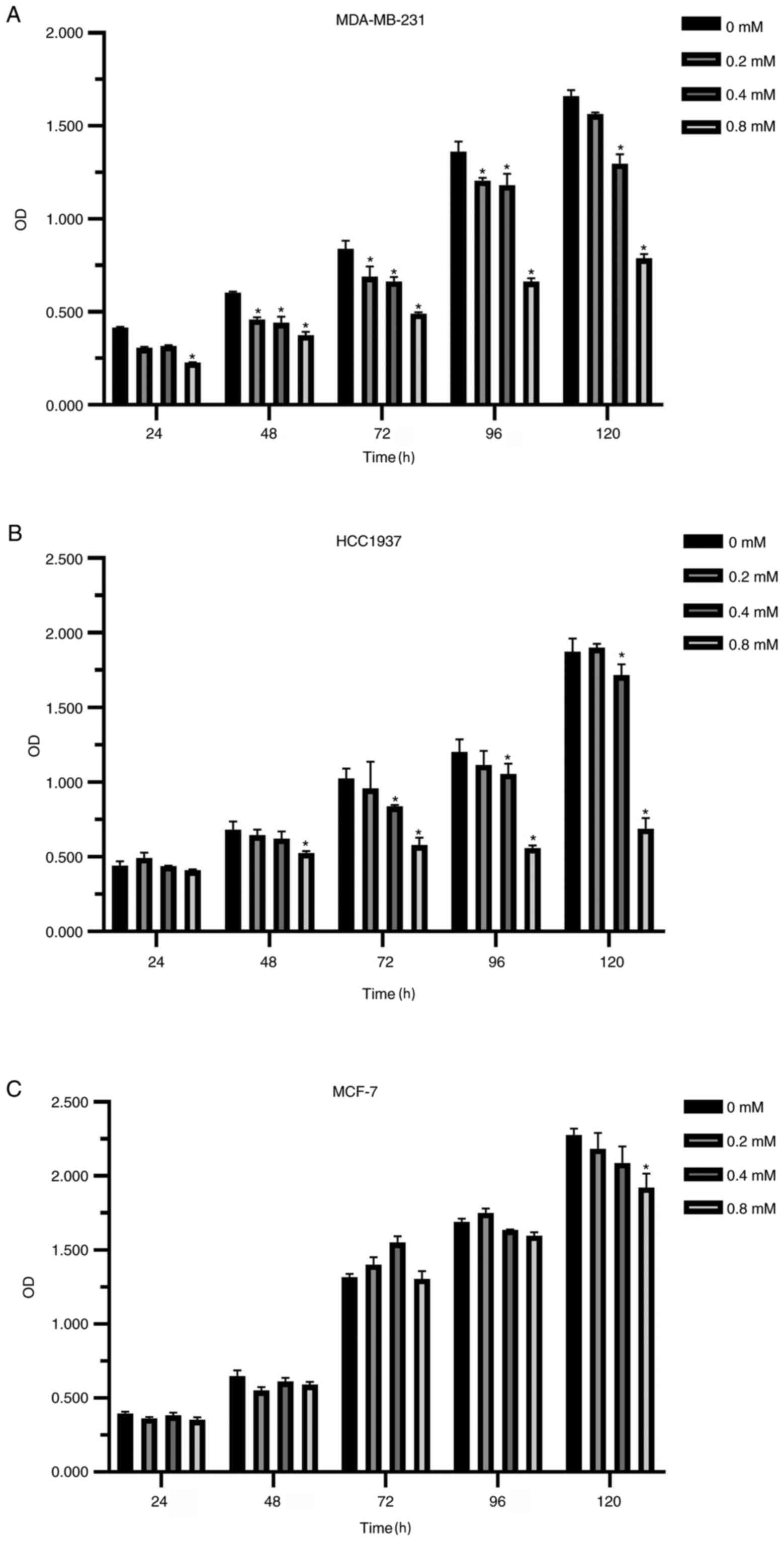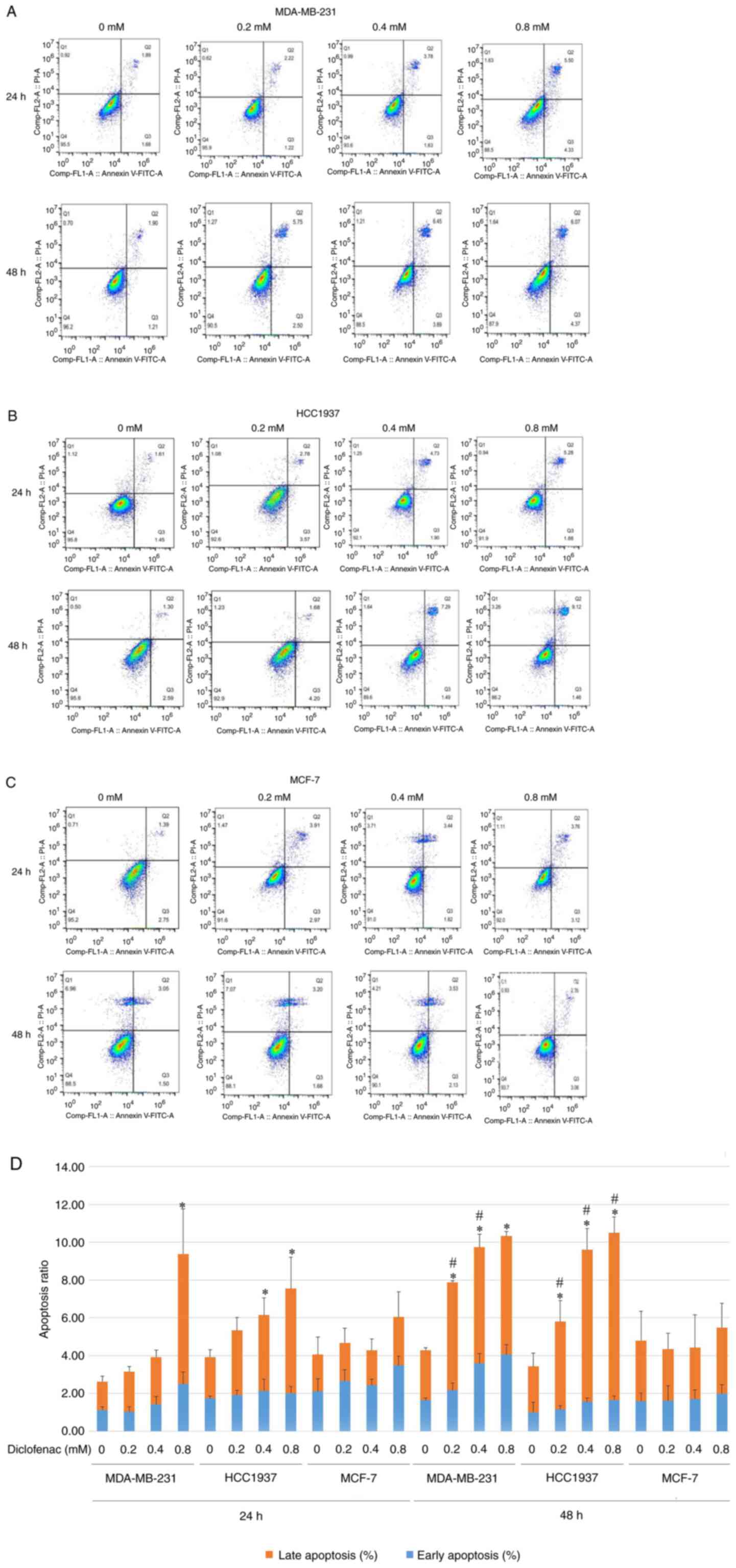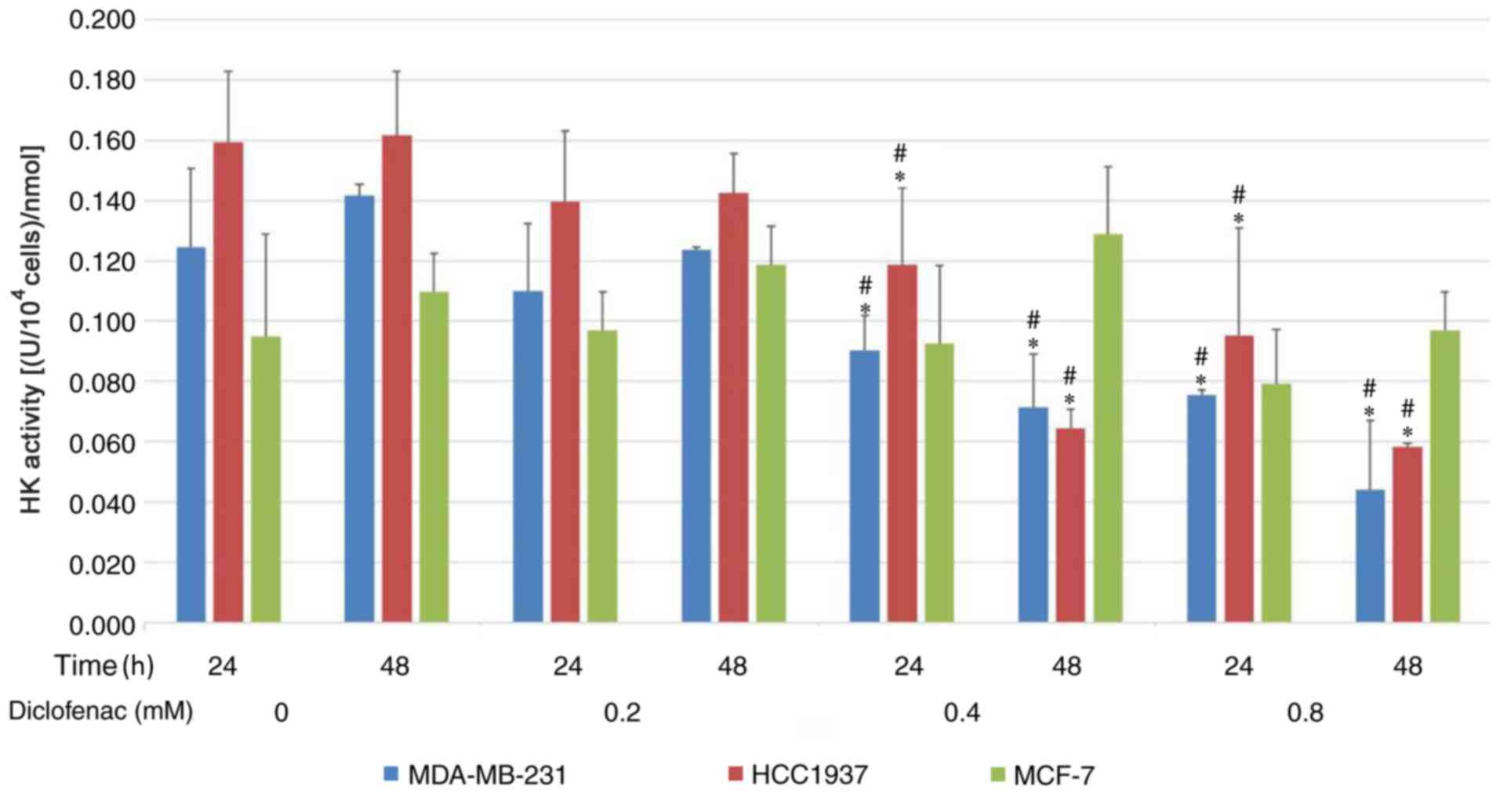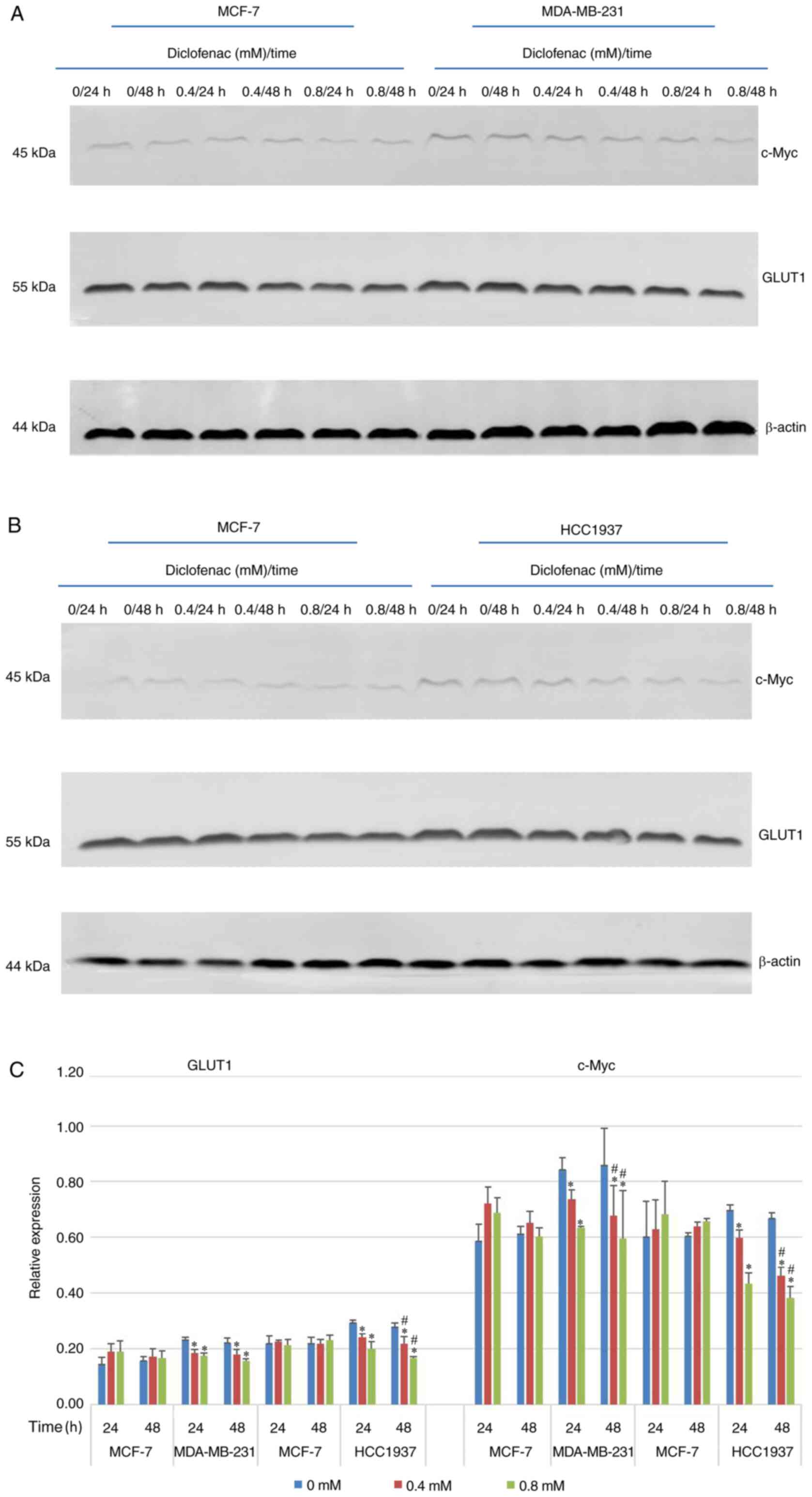|
1
|
Foulkes WD, Smith IE and Reis-Filho JS:
Triple-negative breast cancer. N Engl J Med. 363:1938–1948.
2010.PubMed/NCBI View Article : Google Scholar
|
|
2
|
Shen L, O'Shea JM, Kaadige MR, Cunha S,
Wilde BR, Cohen AL, Welm AL and Ayer DE: Metabolic reprogramming in
triple-negative breast cancer through Myc suppression of TXNIP.
Proc Natl Acad Sci USA. 112:5425–5430. 2015.PubMed/NCBI View Article : Google Scholar
|
|
3
|
Luo C, Wang Y, Wei C, Chen Y and Ji Z: The
anti-migration and anti-invasion effects of Bruceine D in human
triple-negative breast cancer MDA-MB-231 cells. Exp Ther Med.
19:273–279. 2020.PubMed/NCBI View Article : Google Scholar
|
|
4
|
Yin L, Qi XW, Liu XZ, Yang ZY, Cai RL, Cui
HJ, Chen L and Yu SC: Icaritin enhances the efficacy of cetuximab
against triple-negative breast cancer cells. Oncol Lett.
19:3950–3958. 2020.PubMed/NCBI View Article : Google Scholar
|
|
5
|
Li C, Li X, Li G, Sun L, Zhang W, Jiang J
and Ge Q: Identification of a prognosis-associated signature
associated with energy metabolism in triple-negative breast cancer.
Oncol Rep. 44:819–837. 2020.PubMed/NCBI View Article : Google Scholar
|
|
6
|
Warburg O: On the origin of cancer cells.
Science. 123:309–314. 1956.PubMed/NCBI View Article : Google Scholar
|
|
7
|
Long JP, Li XN and Zhang F: Targeting
metabolism in breast cancer: How far we can go? World J Clin Oncol.
7:122–130. 2016.PubMed/NCBI View Article : Google Scholar
|
|
8
|
Deng D and Yan N: GLUT, SGLT, and SWEET:
Structural and mechanistic investigations of the glucose
transporters. Protein Sci. 25:546–558. 2016.PubMed/NCBI View
Article : Google Scholar
|
|
9
|
Godoy A, Ulloa V, Rodríguez F, Reinicke K,
Yañez AJ, García Mde L, Medina RA, Carrasco M, Barberis S, Castro
T, et al: Differential subcellular distribution of glucose
transporters GLUT1-6 and GLUT9 in human cancer: Ultrastructural
localization of GLUT1 and GLUT5 in breast tumor tissues. J Cell
Physiol. 207:614–627. 2006.PubMed/NCBI View Article : Google Scholar
|
|
10
|
Rogers S, Docherty SE, Slavin JL,
Henderson MA and Best JD: Differential expression of GLUT12 in
breast cancer and normal breast tissue. Cancer Lett. 193:225–233.
2003.PubMed/NCBI View Article : Google Scholar
|
|
11
|
Garrido P, Morán J, Alonso A, González S
and González C: 17β-estradiol activates glucose uptake via GLUT4
translocation and PI3K/Akt signaling pathway in MCF-7 cells.
Endocrinology. 154:1979–1989. 2013.PubMed/NCBI View Article : Google Scholar
|
|
12
|
Krzeslak A, Wojcik-Krowiranda K, Forma E,
Jozwiak P, Romanowicz H, Bienkiewicz A and Brys M: Expression of
GLUT1 and GLUT3 glucose transporters in endometrial and breast
cancers. Pathol Oncol Res. 18:721–728. 2012.PubMed/NCBI View Article : Google Scholar
|
|
13
|
Choi J, Jung WH and Koo JS:
Metabolism-related proteins are differentially expressed according
to the molecular subtype of invasive breast cancer defined by
surrogate immunohistochemistry. Pathobiology. 80:41–52.
2013.PubMed/NCBI View Article : Google Scholar
|
|
14
|
Hsieh AL, Walton ZE, Altman BJ, Stine ZE
and Dang CV: MYC and metabolism on the path to cancer. Semin Cell
Dev Biol. 43:11–21. 2015.PubMed/NCBI View Article : Google Scholar
|
|
15
|
Palaskas N, Larson SM, Schultz N,
Komisopoulou E, Wong J, Rohle D, Campos C, Yannuzzi N, Osborne JR,
Linkov I, et al: 18F-fluorodeoxy-glucose positron emission
tomography marks MYC-overexpressing human basal-like breast
cancers. Cancer Res. 71:5164–5174. 2011.PubMed/NCBI View Article : Google Scholar
|
|
16
|
Gottfried E, Lang SA, Renner K, Bosserhoff
A, Gronwald W, Rehli M, Einhell S, Gedig I, Singer K, Seilbeck A,
et al: New aspects of an old drug-diclofenac targets MYC and
glucose metabolism in tumor cells. PLoS One.
8(e66987)2013.PubMed/NCBI View Article : Google Scholar
|
|
17
|
Penny HL, Sieow JL, Adriani G, Yeap WH,
See Chi Ee P, San Luis B, Lee B, Lee T, Mak SY, Ho YS, et al:
Warburg metabolism in tumor-conditioned macrophages promotes
metastasis in human pancreatic ductal adenocarcinoma.
Oncoimmunology. 5(e1191731)2016.PubMed/NCBI View Article : Google Scholar
|
|
18
|
Guo X, Zhang X, Wang T, Xian S and Lu Y:
3-Bromopyruvate and sodium citrate induce apoptosis in human
gastric cancer cell line MGC-803 by inhibiting glycolysis and
promoting mitochondria-regulated apoptosis pathway. Biochem Biophys
Res Commun. 475:37–43. 2016.PubMed/NCBI View Article : Google Scholar
|
|
19
|
Johnson J, Rychahou P, Sviripa VM, Weiss
HL, Liu C, Watt DS and Evers BM: Induction of AMPK activation by
N,N'-diarylurea FND-4b decreases growth and increases apoptosis in
triple negative and estrogen-receptor positive breast cancers. PLoS
One. 14(e0209392)2019.PubMed/NCBI View Article : Google Scholar
|
|
20
|
Pelicano H, Zhang W, Liu J, Hammoudi N,
Dai J, Xu RH, Pusztai L and Huang P: Mitochondrial dysfunction in
some triple-negative breast cancer cell lines: Role of mTOR pathway
and therapeutic potential. Breast Cancer Res.
16(434)2014.PubMed/NCBI View Article : Google Scholar
|
|
21
|
Butt JH, Barthel JS, Hosokawa MC and Moore
RA: NSAIDs: A clinical approach to the problems of gastrointestinal
side-effects. Aliment Pharmacol Ther. 2 (Suppl 1):S121–S129.
1988.PubMed/NCBI View Article : Google Scholar
|
|
22
|
Grosser T, Ricciotti E and FitzGerald GA:
The cardiovascular pharmacology of nonsteroidal anti-inflammatory
drugs. Trends Pharmacol Sci. 38:733–748. 2017.PubMed/NCBI View Article : Google Scholar
|
|
23
|
Barron CC, Bilan PJ, Tsakiridis T and
Tsiani E: Facilitative glucose transporters: Implications for
cancer detection, prognosis and treatment. Metabolism. 65:124–139.
2016.PubMed/NCBI View Article : Google Scholar
|
|
24
|
Zhou YX, Zhou KM, Liu Q, Wang H, Wang W,
Shi Y and Ma YQ: The effect of Glut1 and c-myc on prognosis in
esophageal squamous cell carcinoma of Kazakh and Han patients.
Future Oncol. 14:1801–1815. 2018.PubMed/NCBI View Article : Google Scholar
|
|
25
|
Carvalho KC, Cunha IW, Rocha RM, Ayala FR,
Cajaíba MM, Begnami MD, Vilela RS, Paiva GR, Andrade RG and Soares
FA: GLUT1 expression in malignant tumors and its use as an
immunodiagnostic marker. Clinics (Sao Paulo). 66:965–972.
2011.PubMed/NCBI View Article : Google Scholar
|
|
26
|
Vander Heiden MG, Cantley LC and Thompson
CB: Understanding the Warburg effect: The metabolic requirements of
cell proliferation. Science. 324:1029–1033. 2009.PubMed/NCBI View Article : Google Scholar
|
|
27
|
Geng C, Li J, Ding F, Wu G, Yang Q, Sun Y,
Zhang Z, Dong T and Tian X: Curcumin suppresses 4-hydroxytamoxifen
resistance in breast cancer cells by targeting SLUG/Hexokinase 2
pathway. Biochem Biophys Res Commun. 473:147–153. 2016.PubMed/NCBI View Article : Google Scholar
|
|
28
|
Chauhan A, Paul R, Debnath M, Bessi I,
Mandal S, Schwalbe H and Dash J: Synthesis of fluorescent
binaphthyl amines that bind c-MYC G-quadruplex DNA and repress
c-MYC expression. J Med Chem. 59:7275–7281. 2016.PubMed/NCBI View Article : Google Scholar
|
|
29
|
Chen H, Liu H and Qing G: Targeting
oncogenic Myc as a strategy for cancer treatment. Signal Transduct
Target Ther. 3(5)2018.PubMed/NCBI View Article : Google Scholar
|
|
30
|
Kfoury A, Armaro M, Collodet C,
Sordet-Dessimoz J, Giner MP, Christen S, Moco S, Leleu M, de Leval
L, Koch U, et al: AMPK promotes survival of c-Myc-positive melanoma
cells by suppressing oxidative stress. EMBO J.
37(e97673)2018.PubMed/NCBI View Article : Google Scholar
|
|
31
|
Jayasooriya RGPT, Dilshara MG,
Karunarathne WAHM, Molagoda IMN, Choi YH and Kim GY: Camptothecin
enhances c-Myc-mediated endoplasmic reticulum stress and leads to
autophagy by activating Ca2+-mediated AMPK. Food Chem
Toxicol. 121:648–656. 2018.PubMed/NCBI View Article : Google Scholar
|
|
32
|
Duan Q, Li H, Gao C, Zhao H, Wu S, Wu H,
Wang C, Shen Q and Yin T: High glucose promotes pancreatic cancer
cells to escape from immune surveillance via AMPK-Bmi1-GATA2-MICA/B
pathway. J Exp Clin Cancer Res. 38(192)2019.PubMed/NCBI View Article : Google Scholar
|
|
33
|
Gutiérrez-Salmerón M, García-Martínez JM,
Martínez-Useros J, Fernández-Aceñero MJ, Viollet B, Olivier S,
Chauhan J, Lucena SR, De la Vieja A, Goding CR, et al: Paradoxical
activation of AMPK by glucose drives selective EP300 activity in
colorectal cancer. PLoS Biol. 18(e3000732)2020.PubMed/NCBI View Article : Google Scholar
|
|
34
|
Li Y, Liang R, Sun M, Li Z, Sheng H, Wang
J, Xu P, Liu S, Yang W, Lu B, et al: AMPK-dependent phosphorylation
of HDAC8 triggers PGM1 expression to promote lung cancer cell
survival under glucose starvation. Cancer Lett. 478:82–92.
2020.PubMed/NCBI View Article : Google Scholar
|
|
35
|
Osthus RC, Shim H, Kim S, Li Q, Reddy R,
Mukherjee M, Xu Y, Wonsey D, Lee LA and Dang CV: Deregulation of
glucose transporter 1 and glycolytic gene expression by c-Myc. J
Biol Chem. 275:21797–21800. 2000.PubMed/NCBI View Article : Google Scholar
|
|
36
|
O'Connell BC, Cheung AF, Simkevich CP, Tam
W, Ren X, Mateyak MK and Sedivy JM: A large scale genetic analysis
of c-Myc-regulated gene expression patterns. J Biol Chem.
278:12563–12573. 2003.PubMed/NCBI View Article : Google Scholar
|
|
37
|
Dang CV, O'Donnell KA, Zeller KI, Nguyen
T, Osthus RC and Li F: The c-Myc target gene network. Semin Cancer
Biol. 16:253–264. 2006.PubMed/NCBI View Article : Google Scholar
|
|
38
|
Liu Y, Xiang F, Huang Y, Shi L, Hu C, Yang
Y, Wang D, He N, Tao K, Wu K and Wang G: Interleukin-22 promotes
aerobic glycolysis associated with tumor progression via targeting
hexokinase-2 in human colon cancer cells. Oncotarget.
8:25372–25383. 2017.PubMed/NCBI View Article : Google Scholar
|
|
39
|
Koepsell H: The Na+-D-glucose
cotransporters SGLT1 and SGLT2 are targets for the treatment of
diabetes and cancer. Pharmacol Ther. 170:148–165. 2017.PubMed/NCBI View Article : Google Scholar
|
|
40
|
Komatsu S, Nomiyama T, Numata T, Kawanami
T, Hamaguchi Y, Iwaya C, Horikawa T, Fujimura-Tanaka Y, Hamanoue N,
Motonaga R, et al: SGLT2 inhibitor ipragliflozin attenuates breast
cancer cell proliferation. Endocr J. 67:99–106. 2020.PubMed/NCBI View Article : Google Scholar
|


















